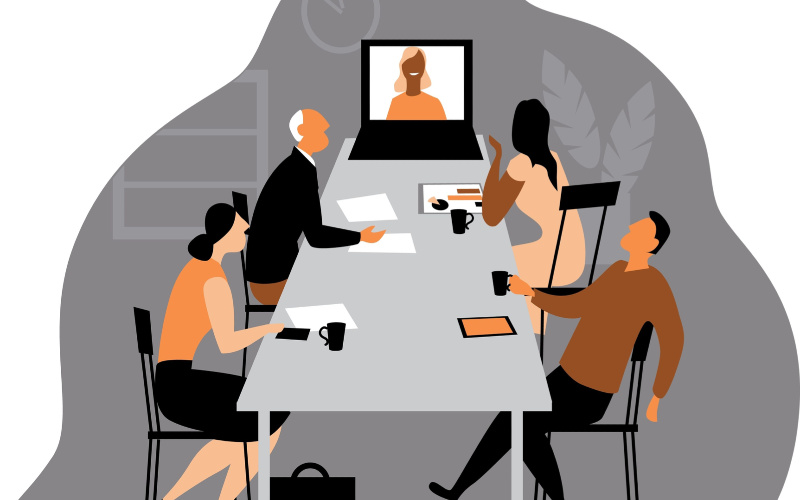For the past two years or so, we all have been operating in a strange work environment. Many of us have experienced trying to work full-time virtual, part-time in the office, and even full-time in the office. For each of us, it has been good, bad, or none of the above, as post-pandemic work styles range from virtual to in-person to hybrid to pick your own style, causing business leaders to hide or run for cover…or in some cases, listen carefully for new solutions.
A March 10, 2022 NY Times article, “A Two-Year 50-Million-Person Experiment in Changing How We Work,” talks about some of the issues associated with this strange new environment that is becoming more normal, if not preferred. What does the NYT, and we at SAMC, see happening? A lot of hope and uncertainty — and people hate the uncertainty.
We are not yet done sorting out the impact of a hybrid workplace.
While the jury is still out on this new model of work, the NYT article points out some interesting observations. Most tellingly, a study of 10,000 office workers conducted in 2021 by the research group Future Forum suggests that “women and people of color were more likely to see working remotely as more beneficial than their white male counterparts.” An in-person office environment worked well for a subset of individuals (white males), but remote work was not the preferred environment for females and non-whites. Furthermore, the study suggests that 86 percent of Hispanic and 81 percent of Black knowledge workers (those who do non-manual work) prefer a hybrid or virtual environment, compared with 75 percent of white knowledge workers.
That “one size fits all” workplace model suddenly does not seem to be an efficient way to operate. Of course, these changes were taking place before the pandemic, as some clients of ours offered remote work options to their staff as benefits.
What are we learning about how workplace flexibility affects productivity?
Are we really surprised that we are not all the same? As the Future Forum survey suggests, it is maybe easier for women and minorities to operate in a virtual environment. That is a big “maybe.” I would not assume that people who are not white males do better in a hybrid or virtual business environment just because they are outsiders or have different values or work habits. Instead, this period of transformation pushes us to learn more about how space and contiguity impact people’s performance at work. Instead of supposing that people will adapt to one-size-fits-all, perhaps we are learning how flexibility can improve productivity, enabling people to work where and how they perform best.
As culture change experts, we are watching closely to see how our clients adapt to these new demands from their employees for options. As we listen, they are growing more understanding and sympathetic to their staff’s issues.
Some of the highlights of the post-pandemic era to pay attention to
Let us delve into a few key points of the current work models and see what we suggest is happening. Consider the following:
- While we believe that people work better in non-tense/non-confrontational environments, there are some things that we give up operating in a virtual environment. People energize people and drive each other forward. We learn from one another. Collaboration is easier to achieve when we are all under one roof.
- Boundaries are better defined “in the flesh.” Is it true that people understand each other’s roles better in person? Maybe there is a new world that has been evolving for quite some time? Change comes a little at a time and then all at once. I preach, “Never waste a crisis.”
- Physically working in one spot makes it easier to observe and understand non-verbal feedback. Conventional wisdom has always said that working next to someone is critical to both the individual’s and the organization’s effectiveness and efficiency. There is a lot of truth to this. People communicate when they read body language and the nuances in facial expressions. Interpersonal interactions require at least some time to tune into each other. What are we losing when we are apart all of the time? Some of the time?
- We learn both formally and informally. Before jumping from one mode of work to another, we must evaluate which is more productive. Perhaps a hybrid environment brings out the best in workers, perhaps not. Maybe it is just the option to be able to work where and when you want that is more important than a fixed system with limited options?
- We are not all stamped from the same mold. While a significant portion of “work” is what we do, personal interactions certainly affect the work environment. For some, this is very comforting; for others, not so much. The virtual part of the hybrid experience can work well for those who might view themselves as outsiders, but might be less than optimal for ones who are social and like in-person sharing of ideas.
- The total learning experience could be compromised for those who seek an entirely virtual experience. Human interaction is part of our experience, a part of learning. The formality and informality of these learning experiences are very different in the workplace versus a virtual environment. Learning the cues in face-to-face meetings is different from virtual experiences. Nothing is good or bad, but a hybrid experience could be critical to success in many organizations.
- Learning to “love” your peers from afar is challenging. Gathering together to collaborate, bounce ideas off each other, and even share jokes or talk about your weekend is very important and can cement relationships for future work efforts. Distance doesn’t always make the heart grow fonder.
The future of work is working now.
Over the past months and for some, longer than that, many businesses have moved from an in-person to a virtual and now a hybrid work environment. Today, as we move toward a mixed way of working and the in-person workplace starts to return, we find ourselves in that uncertain time between what was during the pandemic and what is emerging now.
People do not like ambiguity or uncertainty. They are making decisions that suit themselves, even resigning and finding new places to work. It leads business leaders to make decisions based on emotions, not insights or even data. They decide based on how they feel. It might be a perfect time to think about this from the outside in and ask your employees where and how they work best.
Whatever the workplace model, it is difficult to predict the future. We urge our clients to at least prepare for it. We are beginning to see how hybrid environments encapsulate the best of both worlds and become the preferred future.
So how is all of this change crafting a new work order for bosses, employees and society itself? How are you intentionally responding to your workforce demands? How are you measuring the changes and the impact on you and your teammates? It is a time to change, as painful as change is for all of us.
What we do at Simon Associates
At SAMC, we specialize in helping organizations of all sizes manage culture change. We help you test ideas and come to the right solutions for the moment, the short-term future and your business’s long-term growth. The times are changing very fast now. As anthropologists, we have learned that the secret to people’s success is how they develop, inside and outside, of their business settings. Along those lines, we have developed a very successful approach to helping individuals and organizations attract, retain and develop talent.
We’d love to talk with you about how we can evolve your human development programs. To help organizations and individuals within those organizations become better leaders in these critical times, we regularly conduct leadership academies in many fields across industries. We are also trained executive coaches highly experienced in supporting culture change initiatives focused on building diverse, equitable and inclusive organizations.
To get the conversation started, let’s connect.
From Observation to Innovation,

Andi Simon, Ph.D.
Corporate Anthropologist | Author | CEO Simon Associates Management Consultants
Andisimon.com
Info@simonassociates.net
@simonandi
LinkedIn



